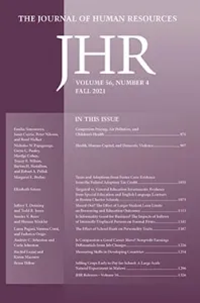人力资本开发
IF 6
1区 经济学
Q1 ECONOMICS
引用次数: 0
摘要
摘要:我们估计了一个动态模型的社会情感技能发展之间的8-22岁的秘鲁队列出生于1994年。与认知能力不同,8岁的孩子没有财富梯度。然而,到12岁时,由于家庭投资差异和认知技能的交叉生产力,不平等现象开始出现,并在19岁时扩大。在成年早期,我们将社会情感技能分为两个截然不同的领域——社会技能和任务效率——它们的进化方式不同,与吸烟或吸毒等危险行为的关联也不同。不平等的初始家庭资源通过认知和任务效率技能使不平等代代相传。本文章由计算机程序翻译,如有差异,请以英文原文为准。
Human Capital Development
Abstract
We estimate a dynamic model of socio-emotional skill development between ages 8-22 for a Peruvian cohort born in 1994. At age eight there is no wealth gradient, in contrast to cognitive skills. However, by age 12 inequalities emerge and widen through age 19, driven by differential household investments, and cross-productivity with cognitive skills. In early adulthood, we separate socio-emotional skills into two distinct domains – social skills and task effectiveness – that evolve differently, and are differently correlated with risky behaviors such as smoking or taking drugs. Unequal initial household resources perpetuate inequality across generations through cognitive and task effectiveness skills.求助全文
通过发布文献求助,成功后即可免费获取论文全文。
去求助
来源期刊

Journal of Human Resources
Multiple-
CiteScore
7.00
自引率
1.90%
发文量
53
期刊介绍:
The Journal of Human Resources is among the leading journals in empirical microeconomics. Intended for scholars, policy makers, and practitioners, each issue examines research in a variety of fields including labor economics, development economics, health economics, and the economics of education, discrimination, and retirement. Founded in 1965, the Journal of Human Resources features articles that make scientific contributions in research relevant to public policy practitioners.
 求助内容:
求助内容: 应助结果提醒方式:
应助结果提醒方式:


